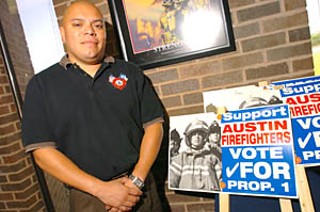Firefighters Want to Bargain
Austin Firefighters bring collective bargaining to the May 15 ballot
By Jordan Smith, Fri., April 30, 2004

On March 8, the Austin Association of Professional Firefighters submitted more than 15,000 signatures to the city clerk's office – far beyond the required 9,000, representing 5% of the voters in the 2002 general election. Five days later, their effort was certified by the City Council, and their quest – approval of collective bargaining in firefighters' contract negotiations with the city – is now in the hands of Austin's voters.
On May 15, Proposition 1 will be posed like this: "Adoption of the state law applicable to fire fighters that establishes collective bargaining if a majority of the affected employees favor representation by an employees association, preserves the prohibition against strikes and lockouts, and provides penalties for strikes and lockouts." Bureaucratic ballot-ese aside, collective bargaining would allow the union to bargain with the city on items related to wages, hours, safety, and other conditions of employment. It is akin to the meet-and-confer labor-negotiation process already in use, but with several key differences.
According to Austin state Rep. Eddie Rodriguez, who has been working with the AAPF on the initiative, collective bargaining has two "absolute requirements": 1) The city and the union must sit down at the bargaining table for a maximum of 60 days, and 2) each party must attempt "in good faith" to reach an agreement. Under the meet-and-confer setup currently used to negotiate the firefighters' contracts, these elements aren't required; there is no deadline on contract talks, and negotiations can proceed without resolution, or to a stalemate without the benefit of a defined procedure for breaking an impasse. Should such conflicts remain unresolved and the previous contract expire, all employment terms revert to the standards defined by the state's basic civil service laws – potentially harming both parties by wiping out any previously negotiated gains, like union-won pay raises or the city's desire to define its own hiring and promotional standards.
Indeed, Austin firefighters have been without a contract for two years – negotiations reached an impasse and never restarted. The details aren't available because meet-and-confer negotiations are secret – another circumstance that would be cleared by adoption of collective bargaining, under which all talks between union and city are open to the public. In all, says Mike Martinez, president of the AAPF, collective bargaining would demystify labor negotiations. "It is a much healthier process," he says, "and, in my view, it depoliticizes the entire process."
Under collective bargaining, once a request is made to meet, the clock starts ticking, offering the two sides a maximum of 60 days to reach an agreement, so that each side must come to the table with realistic goals and proposals. "It forces you to put your best effort forward, or else you won't get anything done," said Martinez. If talks do stall, the process incorporates an arbitration clause, placing the two positions before an independent arbitrator. The City Council can still choose to reject the arbitrator's decision, and each side could appeal to district civil court for a binding decision. Martinez says he can't imagine labor talks ever disintegrating that far, in part because any outsider's decision would be a crapshoot for either party.
There appears to be little organized opposition to collective bargaining – except, perhaps, at the Austin American-Statesman's editorial board, which has opined feverishly that collective bargaining would somehow allow firefighters to run roughshod over the city, beating them into submission over labor demands and boosting taxes. "They seem to think that the city would lose control of the budget," said Rodriguez – a notion Martinez calls ridiculous. "Public safety is going to cost money, whether we have collective bargaining or not," he says. Collective bargaining "is not a nirvana for firefighters, it is just a way to improve upon the process we already have."
Got something to say on the subject? Send a letter to the editor.








